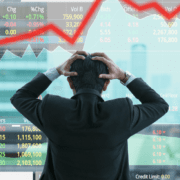5 Potential Risks That Keep Investors Up at Night
When making investment decisions, investors often encounter many challenges. They must select the right deal at the right time on top of worrying about the shifting economy, political climate, and overall market performance. Investors are aware that no matter how strong of an investment portfolio they have, each investment is susceptible to risks – many of which are unpredictable and/or unpreventable. The potential for risks is why informed investors engage in thorough research before, during, and after making investment decisions. New and seasoned investors alike have similar, if not the same, potential investment-related issues on their radar that often keep them awake at night.
Read ahead to discover five potential risks that have a universal impact on investors.
Volatile Markets
With uncontrollable factors including inflation, interest rates, and the economy at large significantly impacting the market, no investor is immune to the ups and downs of a volatile market. Knowing that the market is unpredictable, investors can become skeptical about the market and sometimes expect the worst. In fact, a report by Fortune Magazine indicates that 58% of US investors believe a recession is likely to occur in 2020. The fear of a potential downturn in the market is driving many investors to seek new ways to diversify their portfolios, adding to the stress of waiting to see how these new, unfamiliar markets will perform.
Unreliable Tenants
Tenants can be considered the “bread and butter” of a successful investment deal – after all rent isn’t going to pay for itself. The issue is that all tenants are not created equally, and sometimes unreliable tenants (those who do not make on-time rental payments or who damage the property) end up on the occupant roster. For real estate investors, this type of tenant can negatively impact the investment’s ROI and the rate at which these returns are actually seen.
Shifting Political Climate
The political climate has been proven to either positively or negatively affect investors’ views of the economy. Investors’ respective economical viewpoints impact their investment behavior – which in turn has a direct impact on the stock market and other investment platforms. Specifically, the political situation tends to influence investors’ perceptions of risk and reward, impacting the strategy used in their investment portfolios.
Politically inclined investors tend to see the markets as less risky and more attractive when the party of their preference is in power. On the other hand, when an investor’s preferred party is out of power, their view of the market becomes pessimistic and they tend to see greater risk in the markets. In fact, an estimated 45% of politically-inclined people have unfavorable opinions of opposing parties. With the upcoming presidential election still being months away, there is a lot of uncertainty regarding which party will be elected. For the politically savvy investor, the political climate produced following the election will greatly impact their investment decisions (at least for the next four years).
Escalating Trade Wars
A trade war occurs when countries decide to retaliate against each other by raising import taxes or restricting imports from one another. Because Americans heavily rely on China for goods, the two-year trade war between China and the United States has created market volatility and uncertainty. Amidst this war, US stocks have experienced periods of turmoil. For example, in August 2019 the Dow Jones Industrial Average fell 255 points, dropping to 26,036. At the same time, the S&P 500 dropped 0.7%, closing the day at 2,932.05, while the Nasdaq Composite lost 1.3% and closed at 8,004.07. Needless to say, significant drops in the stock market are a cause for concern for investors, and the trade war has been the source of some of these shifts in recent years. In the end, it seems investors are left with two courses of action: continue to monitor key performance indicators in the US economy or begin to identify counter-cyclical and other investments that can withstand a recessionary economy.
Unpredictable Climate Changes
Climate change, or a long-term shift in global or regional weather patterns, is occurring more rapidly now than in past years. Although climate change is preventable in some cases (such as when it is caused by human actions), it is usually extremely unpredictable. The shifts in weather created by climate changes transform global ecosystems, affecting how people live and breathe – and how investments perform.
The uncertain and changing climates of the world today creates serious challenges for investors with long-term investments. The potential impacts of climate change on these investments include economic consequences from policy and regulatory responses to climate change, and/or indirect effects on financial markets at a global scale through the heightening of broader uncertainty and risk aversion. With so much uncertainty surrounding the earth’s weather patterns, proactive investors must consider adapting their portfolios to mitigate climate-related risks.
With so many risks and potential threats associated with investing, investors sometimes get “cold feet”. Read When CRE Investors Get Cold Feet: How to Provide Reassurance and Regain Trust to learn how sponsors can provide comfort to investors who have become spooked.




